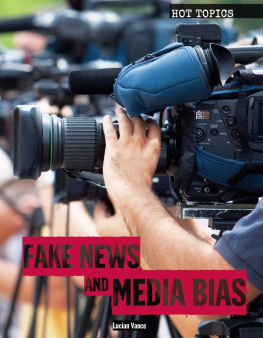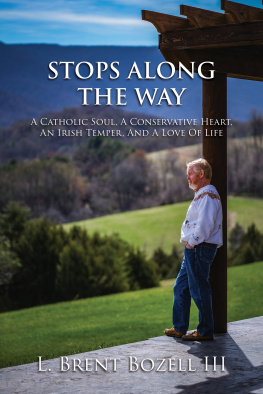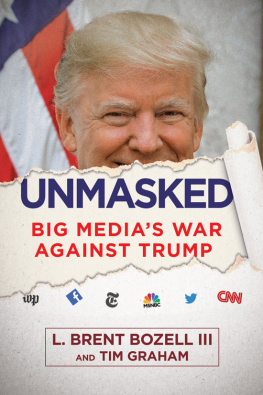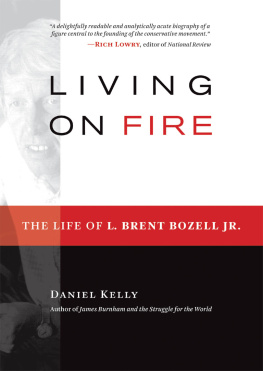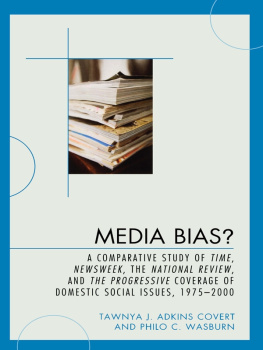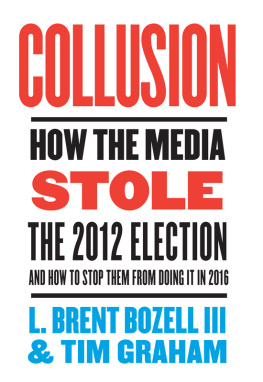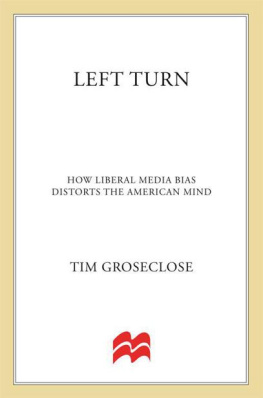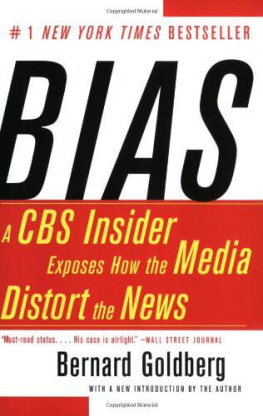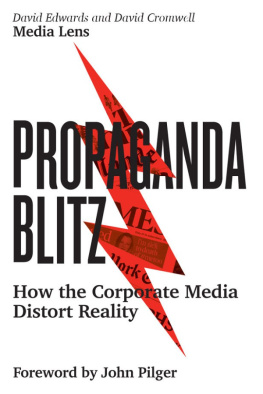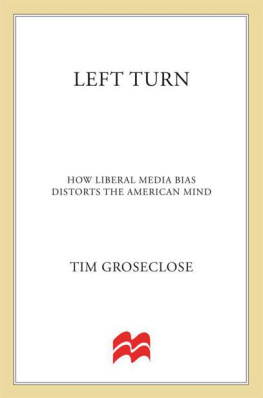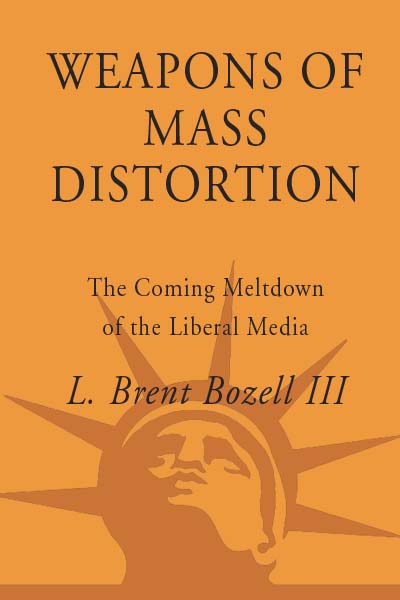
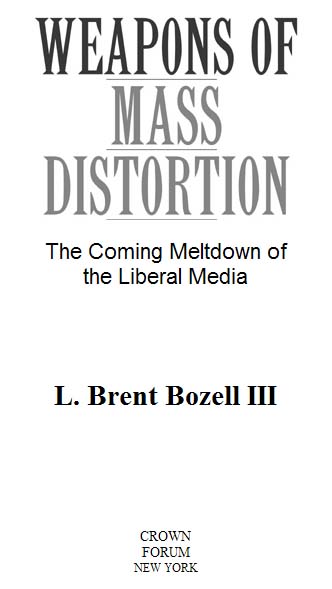
Contents
PART ONE
THE REAL SOURCE OF BIAS
PART TWO
BIAS IN ACTION
PART THREE
ACTORS, NOT OBSERVERS
For Norma
Introduction
Weapons of Mass Distortion
I N AN APRIL 10, 2002, appearance on CNNs Larry King Live, ABC News anchor Peter Jennings gave a remarkable answer when he was asked about media bias.
Historically in the media, it has been more of a liberal persuasion for many years, Jennings said. It has taken us a long time, too long in my view, to have vigorous conservative voices heard as widely in the media as they now are. And so I think, yes, on occasion there is a liberal instinct in the media which we need to keep our eye on, if you will.
It was an astonishing statement. For years, media analysts had been pointing out the pervasive liberal bias found in mainstream news coverage. In fact, in 1987 I founded an organization called the Media Research Center specifically to bring balance and responsibility to the news media, and for some fifteen years the center had been carefully and systematically documenting the extent of media bias. But despite all those efforts, news leaders had vigorously denied any charge of bias, no matter how thoroughly documented. Actually, for the most part the Jenningses, Brokaws, and Rathers refused even to acknowledge the charges, which they could get away with at a time when the American public was less attuned to the leftward slant in the press.
But that time had passed. Now, here was Peter Jennings, one of the most important journalists in the country, acknowledging on national television that, yes, the charge of liberal bias was true.
Then again, was the statement really all that astonishing? Well, yes, simply because no one of his stature had ever come close to admitting that liberal bias existed. (Though Walter Cronkite had acknowledged the leftist bias permeating the airwaves, he did so long after he had retired from CBS News.) But if one looks closely at Jenningss answer, it becomes clear that, to the distinguished anchor of ABC News, media bias really isnt much of a problem at all. Its just an instinct that is evidenced only on occasion. Like a slow leak in a tire, its not something that demands an immediate repair. Its just something we need to keep our eye on.
Jennings also betrayed a fundamental misunderstanding of why media bias is a problem. For too long, he said, conservative voices were not heard as widely in the media as they now are. Quite true, but that statement is slippery on two counts. First, who does Jennings mean by conservative voicesjournalists or their guests? There is no empirical evidence Ive seen that there has been any marked increase of conservatives in the newsroomsnote that were talking about newsrooms, not the pundits roundtablesof ABC, CBS, NBC, CNN, MSNBC, CNBC, and PBS. Second, if by conservative voices Jennings is referencing the opinions of conservatives within news stories, even if journalists are giving more airtime to conservatives, it doesnt follow that the coverage of those conservative voices is any more positive. The implication of his statement is that conservatives now are getting a fair shot in the media, which, as well see in this book, is patently untrue. Even more important, having more conservative voices heard in the mainstream media is just one small step toward balanced news coverage. Liberal bias affects much more than simply how certain political figures are covered and how certain news stories are reported. The medias pervasive bias determines precisely which stories are (and are not) covered, and in how much detail. Indeed, the media elite deliberately attempt to set the national agenda through their coverage of the news.
I have learned this firsthand in a career spent closely analyzing the news media, but the point was driven home to me several years ago at a meeting with a Los Angeles newspaper. The Media Research Center had just released an exhaustive study regarding liberal bias in the news media, and I was scheduled to meet with the editorial board of the (now-defunct) Los Angeles Herald-Examiner to discuss the reports findings. When I arrived, however, I was ushered into the conference room and met by a solitary figure, a member of the editorial board obviously pegged with the unsavory assignment of listening to this pesky conservative. The ponytailed hair and the cold body languagehe silently pointed me to a chairhinted that this would be anything but a productive meeting. I made an opening statement, then passed him the voluminous report we were to discuss. Without bothering to open it, the editor shoved it back at me and unleashed a vitriolic harangue against conservatives. Niceties flew out the window as he snarled, All you conservatives care about is making money! Clearly we werent going to discuss the report, so I asked him what liberals like him cared about. Without bothering to deny my description of his ideological persuasion, he quickly shot back, You just dont get it: We are the social conscience of this country and we have an obligation to use the media.
At least this editor had the decency to admit what so many others steadfastly deny. Yes, the mainstream news medias view of conservatives is less than flatteringthe liberal media see conservatives as the great unwashed, as Republican congressman Henry Hyde aptly put itand that is a big problem. But just as important, and too often overlooked, is the problem of how the media view themselves. The media elites feel they must be the social conscience of this country; they seem to have a higher calling beyond objectively reporting what happens on a day-to-day basis. Reporters, editors, and producers routinely display an arrogance driven by an inflated sense of self-worth. They are the enlightened, the elite. This attitude cannot help but distort the way the news is covered.
Media bias is more than just something we need to keep our eye on. It is an endemic problem, and even now, when the media have actually come under some scrutiny, the problem is not being seriously addressed. Although media bias has become the subject of debate in this country, the terms of that debate are far too narrow. Usually it is focused on a small subtopic, like the number of conservative commentators on television, when news commentary isnt even the issueit is in news reporting that the journalist must strive for objectivity. Or it is focused on a particular statement that gallssay, CNN boss Ted Turners insulting Christiansbut examining such a statement, while instructive, doesnt begin to plumb the depths of the problem of liberal media bias.
Peter Jennings might think that the problem of media bias is pretty much solved, but as this book will show, liberal media bias is alive and well. The evidence of such bias is simply staggering.
The Liberal Counterattack
Although overwhelming evidence indicates that liberal bias in the mainstream news media continues unchecked, something important has changed in recent years. It is not just that news leaders like Peter Jennings have been forced for the first time to answer questions about media bias. No, the Left has come to believe that a battle is on and has begun to attack those dreaded conservatives who dare to challenge the authority and legitimacy of the mainstream news media. But the liberal counterattack has been bizarre. Some on the Left, refusing to admit to the longtime liberal dominance over the mainstream news media, go so far as to claim that there is actually a
Next page

